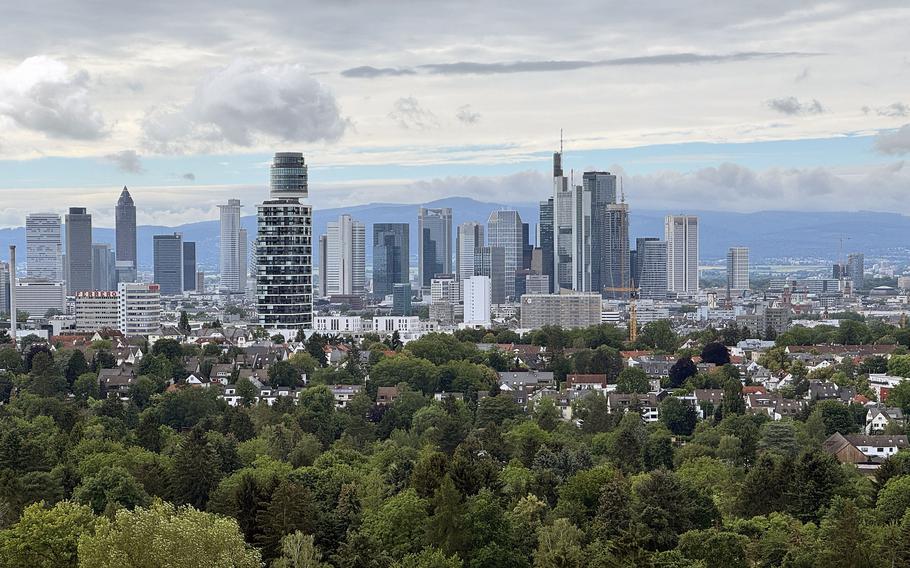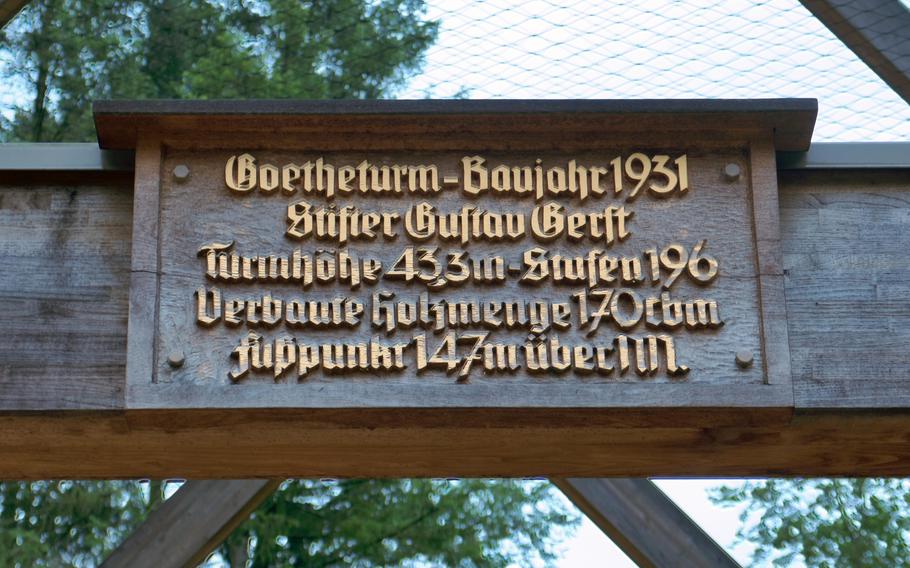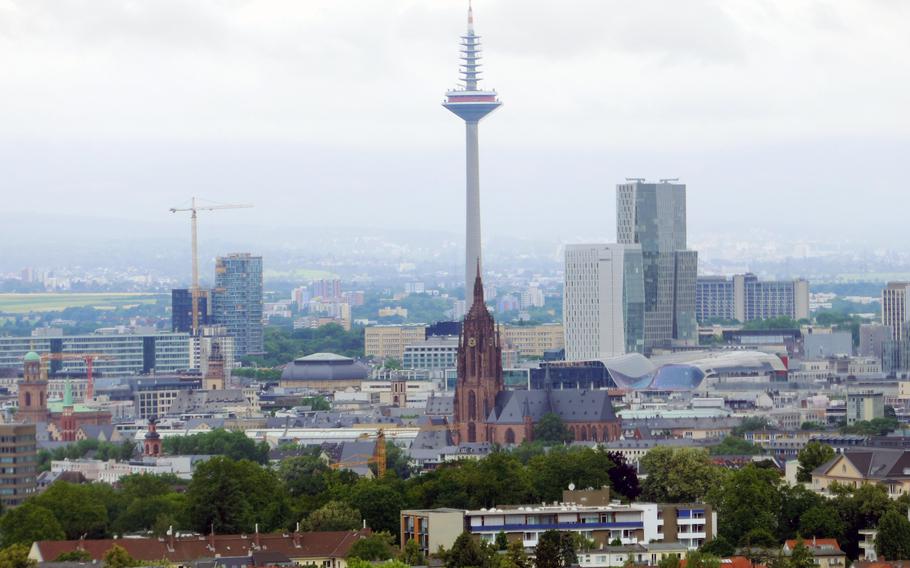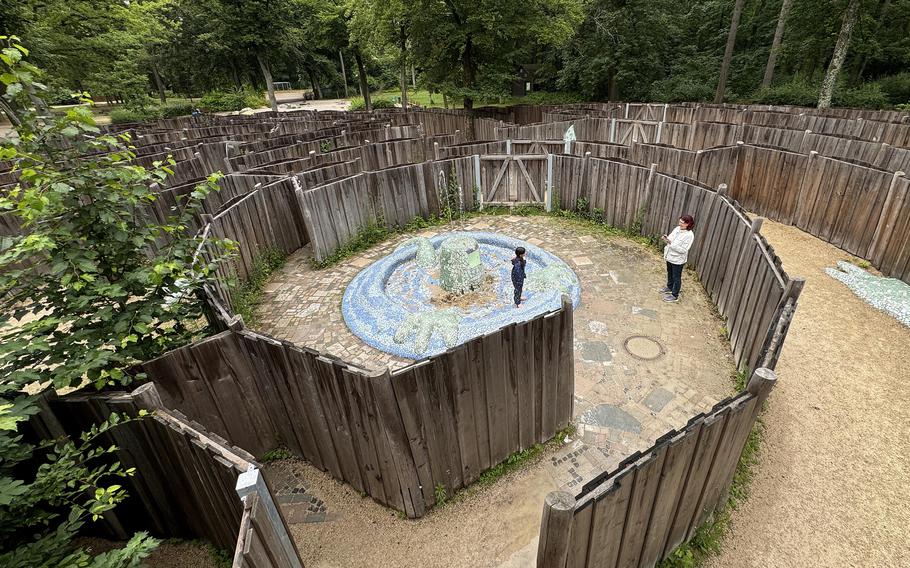
The Frankfurt skyline as seen from the 142-foot-tall Goetheturm. The sightseeing tower is in the forest on the south side of the Main River, on the edge of the city. (Michael Abrams/Stars and Stripes)
One, two, three, four, five, I counted as I began climbing the Goetheturm in Frankfurt. When I got to 10, I still had 186 steps to go before reaching the top platform of the tower.
Not making the ascent any easier was hearing my 5-year-old granddaughter, two landings above, telling me to hurry up so we could get to the lookout point.
Named after Frankfurt’s favorite son — the writer, poet, politician and naturalist Johann Wolfgang von Goethe — the sightseeing tower rises 142 feet above the ground below.
When you make it to the top, which I finally did, what awaits is probably the best view of the Frankfurt skyline. And a magnificent scene it is, a row of skyscrapers towering over and along the Main River.
The climb actually wasn’t as bad as it sounds. After every third flight of stairs there is a landing with a bench to rest on if needed. You can stop and look at the view.
At first just trees, then as you go higher, the city. To the east, south and west, you see mostly trees and maybe high-rise apartment buildings in nearby towns, sticking out over them. But to the north you see what is often called Mainhatten, after another city full of skyscrapers.
The closest one is the Neuer Henninger-Turm, a luxury apartment building with a restaurant on its upper floor in the city’s Sachsenhausen district, on the Main’s south bank. It replaced the original tower, one of Frankfurt’s popular landmarks, which was a grain silo and part of the Henninger brewery complex.

Today’s Goetheturm opened in 2021. The tower was rebuilt after the original structure, dating from 1931, burned down in 2017. (Michael Abrams/Stars and Stripes)
The rest of the high-rise buildings are on the river’s north bank. The Commerzbank Tower, at almost 850 feet, is Germany’s tallest building and until 2003 was the tallest in Europe. Not much shorter, at 842.5 feet, is the pencil-shaped Messeturm at the city’s fairgrounds.
Frankfurt’s tallest structure, the 1,107-foot-tall Europaturm, a communications tower, can be seen in the distance far to the north. What for centuries was the city’s tallest building, the Imperial Cathedral of Saint Bartholomew, better known as the Dom, measures only 312 feet.

The 1,107-foot-tall Europaturm, or Europe Tower, rises high above Frankfurt’s cathedral, as seen from the Goetheturm. (Michael Abrams/Stars and Stripes)
The original 142-foot wooden Goetheturm, built in 1931, burned down in 2017, much to the dismay of Frankfurt’s populace. Almost immediately, plans were made to rebuild it as close to the original as possible. The new wood-and-steel tower opened in 2021.
But wonderful views are not always that interesting for 5-year-olds, especially when there is a playground waiting below.
The descent was easy, and the little one headed straight to the big slide that runs down the side of a hill. The spacious playground has swings, teeter-totters and a water playground where the kids can pump water down and through pipes and pools, and if not careful, get pretty wet.

A girl poses for a photo at the fountain in the playground maze at the foot of the Goetheturm, a sightseeing tower in the woods on the south side of Frankfurt. (Michael Abrams/Stars and Stripes)
More fun is offered by the wooden maze that winds around a fountain at its center. It’s pretty easy to navigate, but we did get caught going the wrong way once or twice.
There are also plenty of paths to hike or bike on near the Goetheturm. We strolled down the main one, the Sachsenhäuser Landwehr.
It passes a clearing known as Goetheruh, or Goethe’s rest, where there is a large sandstone column, lying on its side, which was sculpted by the Scottish artist and lyricist Ian Hamilton Finlay. People sometimes pose resting on it.
If you continue down the path, you’ll come to Scheerwald, another popular playground. We decided to walk back to the tower, exploring the flora and fauna, mostly red Spanish slugs, along the way.
The little one wanted to hit the swings, so I decided to climb the tower’s 196 steps again for one more wonderful view of Mainhattan.
On the QT
Location: Am Goetheturm, Frankfurt. The entrance to the tower and playground is off Wendelsweg. There is free parking across from the tower.
Hours: Daily, May 1 to Oct. 31, 8 a.m.to sundown, or at the latest 8 p.m.
Cost: Free
Information: Online: tinyurl.com/t55s8x5d for the tower and playground; goetheruh.de for the restaurant